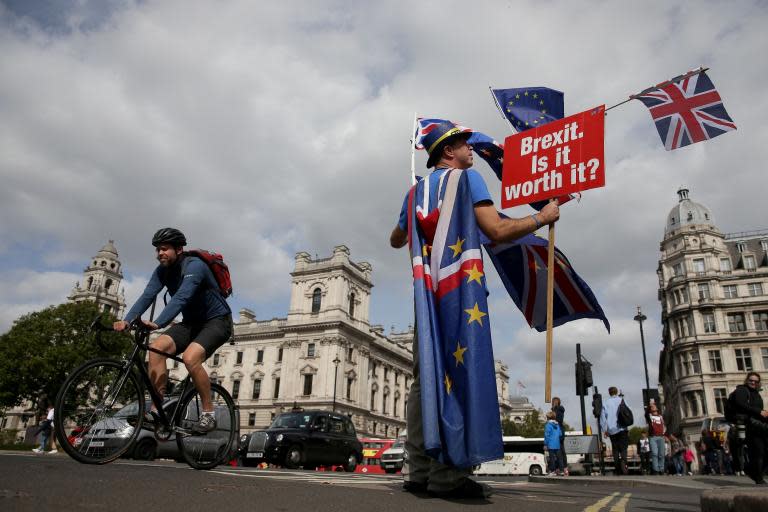A new referendum could stop Brexit destroying this country's heartlands – it’s up to Labour to make that a reality
Of the various myths surrounding the 2016 EU referendum, one of the most damaging is that Leave voters were mostly northern, white and working class. In fact the north, the midlands and Wales were fairly split on the question of Brexit, just like the rest of the country. The millions of Remain-voting residents in our communities and the hundreds of thousands changing their minds because of the failure of the Tories’ Brexit negotiations have been ignored.
While Labour continues to base its Brexit policy on the myth of the northern Brexiteer, and on “respecting the will of the British people”, our heartlands are watching on as the negotiations fail to take account of the needs of our communities, and instead risk causing huge damage to jobs, wages, public services and workers’ rights in these regions.
We joined and support the Labour Party because it is the best defence against Conservative policies that benefit the few not the many – and because we believe in the transformational power of a Labour government. We all want to see Labour in power with a radical agenda that can rebuild and transform Britain. But before a Labour government is likely to be won, Brexit day approaches.
Our departure from the EU could deliver another hammer blow to our communities. Businesses will close; jobs will be lost; stretched public services will lose more essential staff.
Councils and public services will lose funding, as tax receipts fall following the inevitable hit to the economy. In the abstract, a 2 per cent or 5 per cent hit to the local economy doesn’t sound too bad. When it’s translated into fewer nurses, teachers and social workers, however, it hits hard, all the more so in areas like ours that have already been so badly damaged by cuts and austerity.
Our regions and cities have suffered more than most from the disastrous economic and social changes our country has experienced from the Thatcher era onwards. In our communities, we have seen vital industries go under. Unlike in many other European countries, very little effort has been made to replace those jobs and livelihoods. Too many of our people are now in low paid, insecure work.
We now know that the sectors of the economy that keep many of our people in employment – the motor industry, retailing and what remains of British manufacturing – will be hard hit by any form of Brexit, whether through an agreement with the EU or a no-deal departure from the union. Any more hardship is more than we can bear. It’s harder to digest when this is an entirely unnecessary and self-inflicted choice.
Our regions have had more investment directly from the EU than they have had from most UK governments. The UK has nine of the poorest regions in northern Europe, including West Wales, Durham and Tees Valley, South Yorkshire and Northern Ireland. The rapid industrial decline brought about under Margaret Thatcher was the main cause of this poverty and inequality, not the EU.
If Brexit had a hope of fixing any of these problems it might be worth considering, but we know that it will only concentrate more power in London and exacerbate regional imbalances in money, power and income.
The “will of the people” was split in 2016: only 37 per cent of the electorate voted for Leave. Brits in Europe and migrant workers in our regions (the people who face losing the most from Brexit) didn't have a vote. What's more, public opinion is shifting – around 100 constituencies have shifted from Leave to Remain according to recent polling, and more than 800,000 people have signed The Independent’s petition calling on Theresa May to give the people a Final Say on the Brexit deal.
Polling also suggests that all the two million voters Labour gained in 2017 who had not voted in the referendum were Remainers. They are desperate for their party to recognise the threat the feel to their jobs, wages and public services.
Brexit is not a political game. It is an existential threat to the health of our communities.
Our regions consistently return Labour MPs, because we believe in the hope that the Labour Party represents for a better future. We need Labour to fight our corner against this threat to jobs, services and rights in our regions.
In our view, that has to mean Labour backing another vote on the Brexit deal. In 2016 people voted for an idea. This time round we know what it means. As Labour movement activists, we speak to working class people every day who voted Leave and now wish they hadn’t. The least these people deserve is the chance to say yes or no to the final deal. Our movement has to get the vote we need and put forward the socialist case for “remain and reform” of the EU.
Daniel Barwell is a Labour member from Doncaster, Geeta Kauldhar is a Labour member from Wolverhampton and Charles Smith is a Labour councillor in Bridgend

 Yahoo News
Yahoo News 

